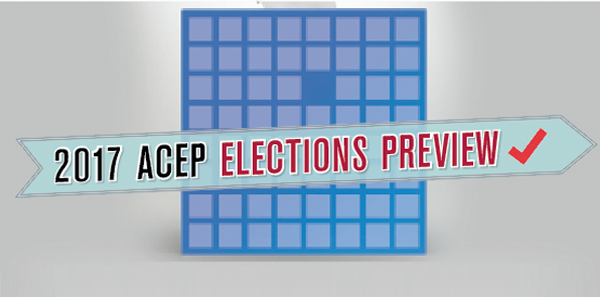
Despite this assault, I have devoted a large amount of my administrative time to protecting and defending my group’s independent practice by carefully studying insurance company behavior, learning their games, and devising strategies to overcome their predatory practices. I don’t have all the answers, and at times, I have had occasional setbacks and challenges. I have learned a lot of things along the way.
Explore This Issue
ACEP Now: Vol 36 – No 09 – September 2017I am proud to say I have created a practice environment that allows physicians to be back in the driver’s seat and in control of their practice. It is possible to stand up to the insurance industry that doesn’t want to appropriately pay us. It is possible, no matter what your practice environment, to have a career that you enjoy and where you have a sense of ownership or control. I will bring the business know-how, resiliency, strategic thinking, negotiation skills, and a deep understanding of payer behavior to the Board. But more important, I will bring optimism. The future can be better than the present for all emergency physicians, and we have the ability to make certain that it is so. I will not represent one type of practice, I will represent all emergency physicians and do so without influence and will be fearless in the pursuit of a better tomorrow for all of us.
John T. Finnell, MD, MSc, FACEP (Indiana)
 Current Professional Positions: fellowship program director, clinical informatics, Indiana University, Indianapolis; president, American Medical Informatics Association (AMIA) Academic Forum; member, AMIA Board of Directors; member, AMIA Education Committee; American Board of Emergency Medicine (ABEM) senior case examiner reviewer; ABEM item writer; ABEM oral examiner; ABEM case development panel
Current Professional Positions: fellowship program director, clinical informatics, Indiana University, Indianapolis; president, American Medical Informatics Association (AMIA) Academic Forum; member, AMIA Board of Directors; member, AMIA Education Committee; American Board of Emergency Medicine (ABEM) senior case examiner reviewer; ABEM item writer; ABEM oral examiner; ABEM case development panel
Internships and Residency: emergency medicine residency, University of California, San Francisco–Fresno
Medical Degree: MD, University of Vermont, Burlington (1991)
Response
I am a practicing emergency physician and ACEP member for over 22 years. I work in Indianapolis at Eskenazi Health. Our hospital is a Level 1 trauma center and one of the teaching facilities for Indiana University’s emergency medicine residency program. My primary role is to lead the clinical informatics fellowship program. I am also a research scientist at the Regenstrief Institute. There are three major issues that currently impact the practice of emergency medicine: psychiatric boarding, the opiate epidemic, and reimbursement.
As a research scientist, I will bring wisdom and analytic skills to help your Board provide solutions for these problems. Regarding psychiatric boarding, how is this defined? Each of us, in our own facilities, uses different terminology to define this common problem. We should aim to find a common definition. Regarding opiates, while we are often able to identify patients, we have few treatment options. Resources should be pooled and patients prioritized. As a research scientist, I’ve led many similar projects and have made critical decisions to help us think strategically about our future.





No Responses to “2017 ACEP Elections Preview: Meet the Board of Directors Candidates”